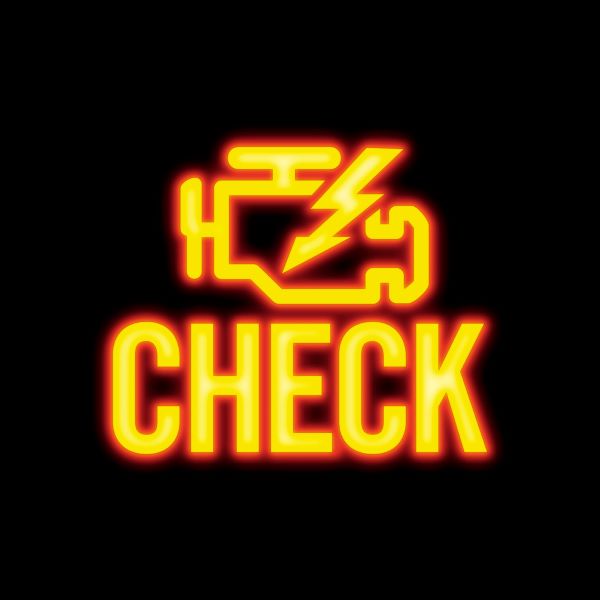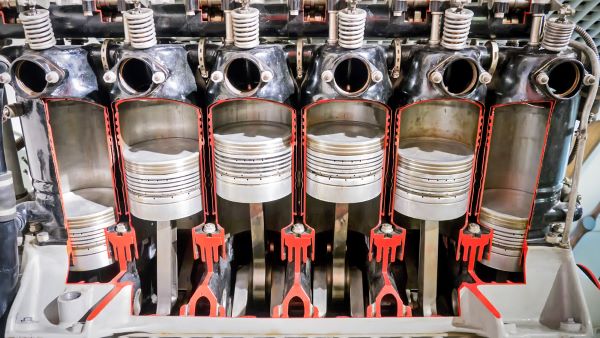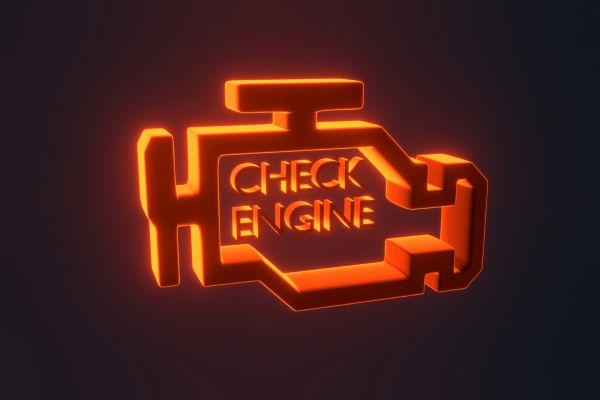The last thing you want to see is your Check Engine Light flashing when accelerating, but it can happen. This alarming condition is usually caused by an engine malfunction that needs to be addressed promptly. If your Check Engine Light is flashing or you are noticing performance issues, you should pull over immediately.

In this article, we look at what to do with a Check Engine Light blinking and how to protect the motor from future damage. By taking prompt action, you can prevent more costly repair bills down the road.
Table of Contents
Different Types of Engine Light Warnings
The Check Engine Light is used to tell you when there is a problem with your vehicle. However, there are different levels of severity indicated by the Check Engine Light. Here are the three ways the light might attempt to alert you.
Constant Illumination: If the Check Engine Light comes on and stays on, you probably aren’t looking at an immediate threat to your vehicle. The fault is likely something minor and you will have time to drive home in most instances for further diagnosis. However, these alerts shouldn’t be ignored. Let’s say you have a fouled spark plug that is causing the alert. By continuing to drive this way, you may later need a catalytic converter, which costs thousands of dollars in some cases.
Intermittent Illumination: If you notice the Check Engine Light on and off intermittently or you get a flashing Check Engine light then stops, you are looking at a mild failure. However, it could also mean that a wire broke and the connection with the alert is bad.
Continual Flashing: When you have a Check Engine Light flashing, you must take immediate action. The flashing Check Engine Light is telling you something major is wrong. At this point, it is best to have the vehicle towed to your nearest service center.
Top Cause of Check Engine Light Flashing: Misfire
An engine misfire is one of the top reasons for a blinking engine light. However, it might also be the reason you are looking at a Check Engine Light flashing then stops suddenly.

Your vehicle’s engine contains several cylinders responsible for combining the fuel and air together for combustion that turns into power. If one of these cylinders malfunctions, you will face a blinking Check Engine Light.
However, the cause of the misfire could be any number of conditions. If you are dealing with a misfire condition, you want to know the symptoms and the causes for further diagnostics.
Symptoms of Misfire: Causing Flashing Check Engine Light
When the Check Engine Light starts flashing, you might be noticing other symptoms, especially if it is a misfire. Some of these symptoms might be more pronounced once you hit higher speeds or RPMs.
Strange Sounds
At first, the misfire might create an unusual sound. It could become worse over time as the condition progresses.
Rough Acceleration
As you push down the gas pedal, you might notice jerkier movement or a rough increase in speed. This condition could combine with the unusual sounds, getting worse as you go faster. You might even notice some sputtering of the engine.
Fuel Smell
If there is any gas smell, you might have fuel leaking from somewhere, keeping it from getting to the cylinders where it needs to be.
Unstable Idle
When the engine is misfiring, you will notice inconsistency with the idle. When operating at lower RPMs, the engine will struggle to run and could also stall as a result of the defect.
Shaking
When a cylinder isn’t operating correctly, the engine becomes imbalanced. This change in weight distribution can cause the entire vehicle to vibrate or shake.
Loss of Power
You might push down the gas pedal and see that the vehicle doesn’t respond. In fact, it could have trouble reaching higher RPMs with a lack of air or fuel in the combustion chamber.
Causes of a Misfire: Leading to a Blinking Check Engine Light
The term ‘engine misfire’ could mean any number of conditions caused by many situations. Basically, a misfire can happen anytime that the air and fuel ratio is off. Here are some of the top reasons for a misfire and Check Engine Light flashing condition.

Defective Oxygen Sensor
A bad oxygen sensor can lead to engine misfiring. This vital sensor monitors the amount of oxygen in the exhaust. Then, the data is sent back to the ECU to determine how much air needs to be pushed into the cylinders. If this sensor sends out the wrong information, the cylinders could end up with too much or too little air.
With too much fuel, the gas wouldn’t be burned fully, causing it to leak out of the exhaust. This condition could cause even more problems.
Failed Mass Air Flow (MAF) Sensor
Another sensor that could go bad is the MAF sensor. This air flow component measures how much air is used during combustion, allowing the ratio to be adjusted as needed. However, the sensor can easily fail due to contamination from a dirty air filter.
When the MAF sensor fails, you might also notice a reduction in performance, poor fuel economy and a rough ride, especially while accelerating. While these sensors aren’t usually difficult to replace, some models can get a little pricey.
Spark Plug Failure
As part of the regular maintenance you perform, you should be changing the spark plugs. However, if you have neglected the plugs or there is another internal issue, you could face corrosion and fouling. Any defect with the spark plug can lead to a misfire and a Check Engine Light.
Failed Ignition Coil
Additionally, you might be dealing with trouble with the ignition coils. These vital parts convert voltage, helping to create the spark to ignite the fuel and air mixture. An OBDII scanner can help you hunt down the ignition coil that is faulty.
Charging System Faults
If the car battery is failing, you could experience symptoms that are similar to a misfire. To prevent this, you should keep the battery charged and check the alternator’s health regularly.
Broken Fuel Cap
Have you ever pulled away from the gas station with your fuel cap off? It’s happened to the best of us and is one of the most common reasons for the Check Engine Light to come on. However, this will rarely cause the light to flash and shouldn’t cause misfiring in most situations.
Still, if you are having performance issues and the light is on, this is the easiest problem to fix, which is why you should check this first. Try to close the cap better and drive. If the engine light goes off, there’s nothing more you need to do. You can also examine the cap to make sure it isn’t cracked. Thankfully, if it is cracked, you can replace it inexpensively and avoid costly repairs.
Defective Catalytic Converter
One issue you don’t want to deal with is a bad catalytic converter. This part converts dangerous gases from the emissions into safer products before they enter the environment. When you don’t perform regular tune-ups and you drive with bad spark plugs, you cause the converter to fail.
Sadly, replacing a catalytic converter could cause a bill of up to $1,000 or more. That’s why you should do everything in your power to prevent this condition.
Overheating Engine
It’s never a good thing to have an engine overheat. Normally, this condition only occurs when something else is wrong, such as a cooling system failure. If your engine overheats and the Check Engine Light is flashing, you want to pull over before more damage occurs.
Defective Cylinder Gasket
After the engine overheats, you are more likely to deal with a failed cylinder gasket. When this vital component fails, engine oil and coolant mix together when they shouldn’t. This condition left untreated leads to complete engine failure, requiring a very costly replacement.
Engine Compression Issues
Misfires can also be caused when there isn’t enough compression in the cylinders. Any leak in the cylinders causes trouble with the combustion of the air and fuel mixture. Without the right amount of pressure, you are going to have trouble accelerating and the vehicle might shake.
Cost to Repair Engine Light Blinking
The cost to repair the blinking Check Engine Light depends on what is causing it. As you saw by the list above, there are many possible reasons you are dealing with this, and these are just the tip of the iceberg of what could be wrong.

Aside from the cause, it also depends on what kind of vehicle you are driving. The cheaper compact car won’t normally cost as much to repair as a large luxury SUV. However, we can offer some estimates on the top fixes to give you an idea of what you are looking at.
Replacing the spark plugs might only cost you about $30 for the parts and an hour of labor if you can’t do it yourself. This simple step keeps you from needing a new catalytic converter, which can easily cost $1,000 or more.
Additionally, replacing an ignition coil might cost you $100 plus the labor. However, if you need to replace the engine, the cost could be astronomical. In some cases, it makes sense to rebuild the engine or purchase a used motor instead. Otherwise, if the vehicle is old and not worth fixing, it might be time to get a new model. At least you shouldn’t have to deal with the flashing Check Engine Light anymore.
Conclusion
If your Check Engine Light is flashing, don’t panic. Instead, pull over to the side of the road and have the vehicle towed for diagnosis. With prompt action, you can ensure that the vehicle continues to drive many more miles.
